Music education in The Gambia
By Oko Drammeh
This text provides an overview of music education in The Gambia, beginning briefly with its origins before looking in more detail at education at primary school, high school and tertiary levels, as well as private academies and other educational projects.
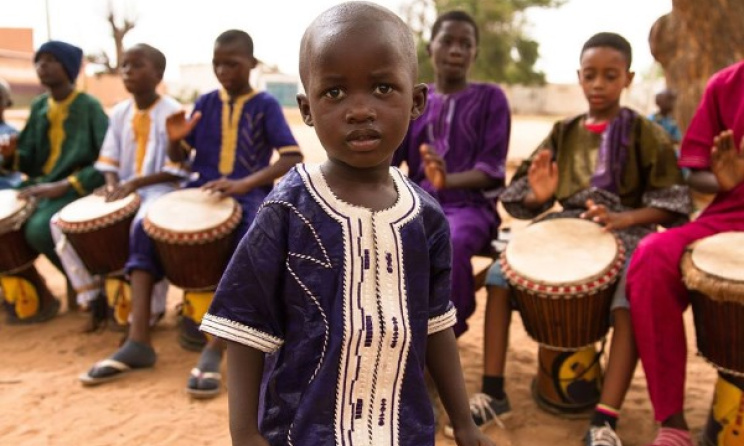 Students at the Amadu Bansang Jobarteh School of Music. Photo: Facebook
Students at the Amadu Bansang Jobarteh School of Music. Photo: Facebook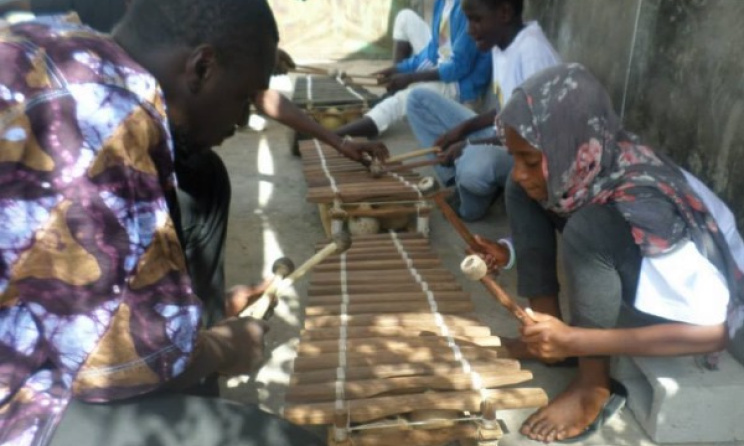 Students at the Amadu Bansang Jobarteh School of Music. Photo: Facebook
Students at the Amadu Bansang Jobarteh School of Music. Photo: Facebook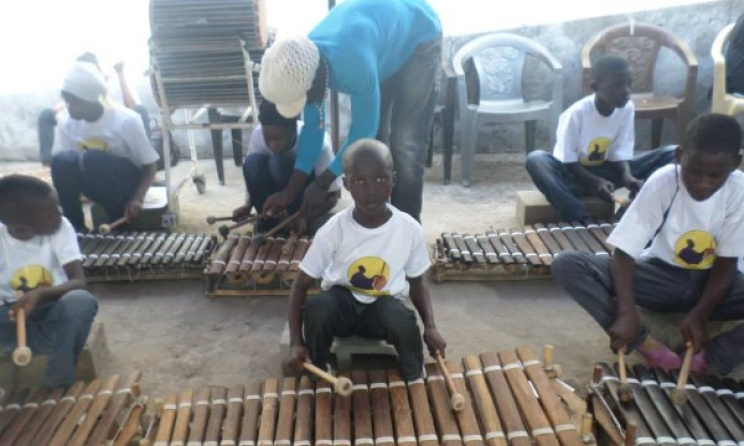 Students at the Amadu Bansang Jobarteh School of Music. Photo: Facebook
Students at the Amadu Bansang Jobarteh School of Music. Photo: Facebook
Music education in primary schools
Today, schools in the Gambia do not teach music as a priority. The songs that remain in the school system since the end of the colonial era in 1965 are the National Anthem of the Gambia and the Police Band marching songs that accompany Gambian marching bands at parade ceremonies and national occasions. They are taught to the children in simple notes that both teachers and children can adapt to perform at various government functions. Other than that, the only songs sang in schools are local songs used in theatre and drama, which students learn without requiring a special music teacher for tutoring.
In the Gambian primary school system, the Wesley School, a British colonial establishment, introduced music lessons and formed a boys’ symphony group. Here Christian boys were formed into a music ensemble playing European classical music. The Wesley School was not restricted only to Christian scholars but they also enrolled Muslim children into the school, albeit not into the music symphony. The Wesley School and the Gambia High School (founded in 1959) introduced music lessons at primary school level in classes as a part of the school curriculum. The music syllabus includes lessons for instruments such as choir, flute, clarinet, bamboo flute, oboe, rattle drum, bass drum and snare drumming for marching parades.
Most established schools in the Gambia have a traditional being run by religious groups. Besides Christian schools, Muslim schools teach music, typically Arabic songs without instruments or drumming performed at special Muslim ceremonies. For example, the Muhammedan Primary (or Lower Basic) School (founded in 1903) is one of the largest and most established Muslim schools in the country and uses Arabic songbooks to teach music.
Music education in high schools
The Gambia Senior Secondary School (formerly Methodist Boys High School) has its origins in the Wesleyan Church in 1876, when the institution was founded on Dobson Street in Banjul by the Wesleyan Mission. This followed the visit over 25 years earlier of Mother Anne-Marie Javouhey, first of the Sisters of St. Joseph of Cluny, who visited Bathurst and planned a mission, which came into being in 1849. In 1898 the school was re-opened as the Methodist Boys High School and in 1915 the Girls High School was opened in what is currently Albion Lower Basic School.
The girls' and boys' high schools were merged in 1959 to form the Gambia High School (GHS) and moved to the junction at the main entry point into the Banjul capital and Box Bar Road. The music instructor of the GHS was Mr Pye, a British piano player, school teacher and conductor (from 1959 to the early 70s). He started his music teaching at the Methodist Primary and High Schools and the Methodist Boys High School. In 1994 the name was changed yet again to the Gambia Senior Secondary School when the government's education policy was changed. GHS has produced some of the finest piano players, such as Crispen Grey Johnson, because they had a piano in the school hall and students would take turns using it to demonstrate their skills.[i]
Other old high schools at the time, like St Augustine’s High School and St. Joseph’s Convent, also taught music, but only religious songs, not contemporary music.
Crab Island School (consisting of an Upper Basic and Senior Secondary schools) is where many popular Gambian musicians studied music, such as Ousman Sosseh Chex of the Magadan Ban and Abdel Kabir of the Gelewar Band. It is a middle high school where music is given priority, along with drama. In this school, music notation is taught and reading is encouraged in all instrument and singing lessons. In the 1960s and 70s the school had two music teachers, the late Mr Bittaye and Mr George. Mr.George taught pan flute and melodica, while Mr Bittaye taught trumpet and trombone. The curriculum includes music studies and after-school classes for instrument training. The Crab Island theatre group has produced two of the finest singers in the Gambia, Fatou Joof and Santiyoung Secka, who feature regularly on Radio Gambia.[ii]
There are newer, private high schools in the Gambia, namely SBEC International School[iii], the Marina International School[iv] and the Banjul American Embassy School (BAES)[v]. These schools teach music lessons as part of their curriculum. They are funded by private, foreign donors, unlike Gambia public schools that depend on government resources, such as Crab Island School. The children in these private schools are not only Gambians but also include Europeans, Americans and children of African diplomats based in the Gambia.
Held at the end of each year in the Gambia is the popular National inter-school singing competition. Kids who participate often spend long hours studying and practicing for the contest. This event gives students a chance to learn their singing, songwriting and performance skills. Their families get involved, for example in dressing up their kids like the local stars they imitate on stage. Many of the most popular singers in the Gambia (and in neighbouring Senegal) did not take music lessons but came out of school singing contests. These include female singing sensation Sambou Suso, Cess Ngum, and many others. This is where they are able to establish a fanbase and eventually move on to selling records and appearing on national radio and TV.
Individual schools also host their own talent competitions, such as Nusrat High School in Tallinding, Serekunda[vi], St. Peter’s in Lamin Village[vii] and St Therese's in Fula Bantang. Every school grooms their own cast of would-be stars.
Music education at tertiary level
The University of the Gambia (UTG)[viii] in Sere Kunda, established in the late 1990s, is the Gambia’s only university. Unfortunately it does not have a music class as yet but recently announced that a faculty of music will soon be established. Students are eager for the commencement of this programme, although the government has not yet set a date or time frame for its introduction.
Private academies and other educational projects
The Gambia Police Force (GPF) is an important institution through which Gambians can become professional musicians and start their own bands. Many popular Gambians had their music lessons from The Gambia Police Marching Corps, including members of the legendary Ifang Bondi band such as Pa Njie (bass), Ali Harb (saxophone), Paps Touray (vocals) and Samson Gassama (percussion). The corps have three music divisions, namely: the Army Band, the Police Band and the Royal Corps Marching Band. School leavers enrolled in these groups are taught how to play instruments such as the saxophone, trombone, flute and clarinet.
Griot families’ homes have been used as schools for international students from Europe and the USA for many years. Some of these griots travel to European schools and universities to teach the art of Kora and Balafong music. The Smithsonian Institution in the USA and the Guildhall School of Music and Drama in the UK regularly send students to the Gambia to live and study with the griots in their family house and learn their traditions and songs.
The Amadou Bansang Jobarteh (ABJ) School of Music is Gambia’s first music school dedicated exclusively to the study of Manding Music, one of West Africa’s oldest surviving musical traditions, for both Gambians and international students. It was opened in 2014 by notable Kora musician Sona Jobarteh in honor of her grandfather, kora master Amadou Bansang Jobarteh. The school’s main mission is to promote and cultivate knowledge and expertise in traditional music amongst youngsters in the Gambia[ix].
The Mandingmorry Academy of Music (MAM) was established in 2012 and is run by the Mandingmorry Foundation for Performing Arts (MANFOPA) and funded by the Roskilde Festival Society in Denmark. In 2014 he academy graduated 16 students in music theory and practice. The two-year training includes music notation, singing, harmony, speech and ear training, arranging, performance, and music business and administration (including copyright and publishing, public speaking and communication, artist management, marketing, music technology, new media, finance and live event management) and training in instruments such as Djembe drums, guitars (acoustic, rhythm and bass) and traditional instruments like Kora and Balafong. The academy also has its own recording studio for practical work[x].
Education Through Culture and Communication Organisation (ECCOGambia) is an NGO promoting cultural education and entrepreneurship in the Gambia, and using culture as a tool for communication for social issues related to health and democracy. They run courses in West African Music, Dance and Storytelling for university students from Europe and the USA, as well as training local education students in traditional music and dance. ECCO assists various community-based organisations in the construction of cultural camps and trains community groups in the management of cultural camps. ECCOGambia is spearheading the Culture Kids programme in The Gambia in collaboration with the Ministries of Basic and Secondary Education, Higher Education and Tourism and Culture[xi].
Through institutions and initiatives such as those outlined above, music education in the Gambia continues to grow and provide new opportunities to aspiring young musicians, to develop the local music industry and to promote Gambian music throughout the continent and the rest of the world.
[i] https://www.facebook.com/gambiahigh [ii] https://www.facebook.com/pages/Crab-Island-Secondary-School-The-Gambia/114938918523385 [iii] www.sbecinternational.gm [iv] www.marinaschool.edu.gm or https://www.facebook.com/pages/Marina-International-School-Banjul-The-Gambia/125197034189129 [v] http://www.baes.gm/ [vi] http://standard.gm/site/news/6185-Nusrat-students-club-competition-wraps.html [vii] https://www.facebook.com/pages/St-Peters-High-School-Lamin-Village-The-Gambia/176210319104818 [viii] https://www.facebook.com/utg.gambia [ix] http://www.abjmusicschool.org [x] www.mandingmory.org [xi] http://www.ecco.gm/about.php




















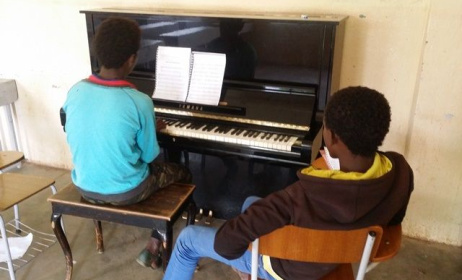




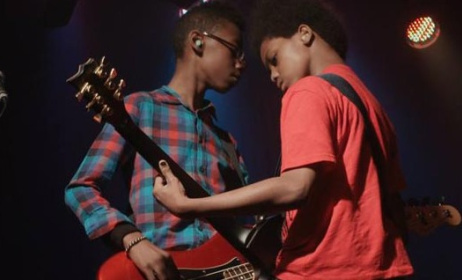
Commentaires
s'identifier or register to post comments